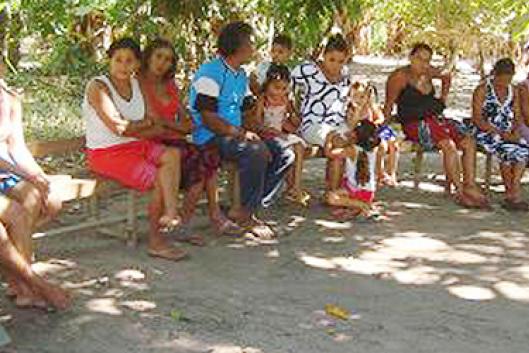Francisca Maria is 36 years old, mother of 3 children, married for 17 years. She is also a leader in the community of São Raimundo. São Raimundo is located in the region of Baixo Parnaíba, in the Brazilian state of Maranhão. This region of fertile land and abundant water suffers constant attacks by soy and eucalyptus agribusiness, the later, represented by the company "Suzano Papel e Celulose," one of the largest producers of pulp and paper in Brazil. Suzano already succeeded in seizing various territories of traditional communities in the region. But the community of São Raimundo resists these incursions of monocultures until today. We talked with Francisca about what health means for this community that has managed to keep its territory and the cerrado (tropical savannah of Brazil), about how eucalyptus and agribusiness are affecting them and about the role that women play in the leadership of the community.
Can you tell us about important elements that ensure the health of the community, health understood in a comprehensive, holistic way?
Here in São Raimundo, I believe we have a little bit of everything to ensure quality of health for the community. One of the main things that we do not have here is eucalyptus, and we are clear that it does not bring health. For health is to have a preserved forest, to have the animals of the forest. Health is to have good water quality, health is to take in and see the natural beauty we have, that is health for us. Health is permanently protected vegetation along the river banks, very green, well preserved by the community. All of that is health for us. Health is our green cerrado, our blooming cerrado of pequi, of bacuri (typical fruits of the cerrado in that region of Brazil), of medicinal plants. Health is to have a group of women in leadership, leading, because they see things in a different way some men do, they try to find a better way to work with other women, to convince them, affectionately. So all of that is what represents health for us.
And what is happening here in the region that threatens the health of the community?
One of the main things that happens in our region is the growing presence of eucalyptus. In order to cultivate it, a product that pollutes the air is used. In recent times, in some communities in our region, we realized that children were coming down with fever, flu, viral infections, diarrhoea; people and animals died. Then, over time, we began to realize that all this came from agribusiness' contamination, from those entrepreneurs who bring agribusiness here, to our community, because of the immense advance of eucalyptus.
What damage does the eucalyptus do specifically to women? Are there impacts that only affect women?
For us, if eucalyptus were present in our community, it would mainly affect women. Why? Because we have a bacuri plantation project which provides some of the community's income from December to March. It affects us a lot because men leave for the harvest, and while they are there, women remain in the cerrado. When they do not have money to buy, womengo to the cerrado and in just 30 minutes harvest bacuri, then take the fruit's pulp to the market, where they sell the pulp and then buy fish and meat; and this way they manage to feed their children. Thus, the expansion of eucalyptus would affect the community a lot. Eucalyptus taking over the cerrado that sustains the community would disturb a lot, would make us sick; , women would be unwell too, not knowing what to do.
What would you say to a community trying to cure this "disease" called eucalyptus?
I would tell them to hold on to their position of resistance, like São Raimundo does until today; to stand together in unity, to search for allies and partners, to organize. The main step is unity, and not to accept eucalyptus plantations in the communities in any way. Try to do what São Raimundo did. At first, when they tried to introduce the eucalyptus [plantations], people of São Raimundo came together, sometwo hundred people from the community: Young people, adults, children, pregnant women, and we debated and eventually concluded not to accept [the advance of eucalyptus]. We never consented to any form of eucalyptus plantations. Today São Raimundo remains an example among the communities in the municipality of Urbano Santos. São Raimundo remains the example of resistance and our position is to resist and say no to eucalyptus.
In this community that resisted the incursions of soy and eucalyptus, what difference did it make to have women in the leadership of the community?
Here in São Raimundo women make the difference because they are always in the forefront of our actions. As a woman in leadership, I have already been involved for 8 years and now there is another woman joining the leadership. We have a different way of working , different ways of motivating others, a different kind of courage, as women, as mothers. It is not easy, but for how we want to win, make a difference, men sometimes do not have that courage that women do, that willpower, so women take the lead and carry the struggle forward and encourage others. And we motivate other women. Because we notice that men are feeling tired while us women, we are not. We want more, we want to see a difference, so we carry the struggle forward. We try to convey this motivation to our compañeras, and we have courageous compañeras in our midst. I am part of a group of 8 women with whom I tend a small field. We are growing black beans and irrigation will be installed. The field was the result of a debate where we invited some men who did not want to participate, so our group of women carried this idea forward and it is working. Therefore, we are strong.
